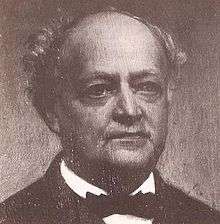Ludwig Ritter von Köchel
Ludwig Alois Friedrich Ritter von Köchel (German: [ˈkœçəl];[Note 1] 14 January 1800 – 3 June 1877) was an Austrian musicologist, writer, composer, botanist and publisher. He is best known for cataloguing the works of Mozart and originating the 'KV-numbers' by which they are known (KV for Köchel-Verzeichnis).
Ludwig Ritter von Köchel | |
|---|---|
 Ludwig Ritter von Köchel | |
| Born | 14 January 1800 |
| Died | 3 June 1877 (aged 77) |
| Nationality | Austrian |
| Occupation | musicologist, writer, composer, botanist and publisher |
| Known for | Köchel catalogue |
_%E2%80%93_Gerd_Hru%C5%A1ka.png)
Life
Born in the town of Stein, Lower Austria, he studied law in Vienna and graduated with a PhD in 1827. For fifteen years, he was tutor to the four sons of Archduke Charles of Austria. Köchel was rewarded with a knighthood[Note 2] and a generous financial settlement, permitting him to spend the rest of his life as a private scholar. Contemporary scientists were greatly impressed by his botanical researches in North Africa, the Iberian Peninsula, the United Kingdom, the North Cape, and Russia. In addition to botany, he was interested in geology and mineralogy, but also loved music, and was a member of the Mozarteum Salzburg. He died of cancer at age 77 in Vienna.
Köchel catalogue
In 1862 he published the Köchel catalogue, a chronological and thematic register of the works of Mozart. This catalogue was the first on such a scale and with such a level of scholarship behind it; it has since undergone revisions. Mozart's works are often referred to by their KV-numbers (cf. opus number); for example, the "Jupiter" symphony, Symphony No. 41, KV. 551. At the same time that Köchel was writing his catalogue Otto Jahn was making a comprehensive collection of Mozart works and writing a scholarly biography of Mozart. [1] When Jahn learned of Köchel's work he turned over his collection to him. Köchel dedicated his catalogue to Jahn.[2]
Other works
Moreover, Köchel arranged Mozart's works into twenty-four categories, which were used by Breitkopf & Härtel when they published the first complete edition of Mozart's works from 1877 to 1910, a venture partly funded by Köchel.
Notes
References
- Otto Jahn, Life of Mozart– tr P. D. Townsend Cooper Square Publishers Inc ISBN 9781108064859
- Robert Levin, Who Wrote the Mozart Four-Wind Concertante pp15-16 ISBN 0-918728-33-9 {{|date=December 2019}}
- Köchel, Ludwig von (1872). Thematisches Verzeichniss der Compositioner von Johann Josef Fux. Wien: A. Hölder. OCLC 9116963.
- Brook, Barry S.; Viano, Richard J. (1997) Thematic Catalogues in Music: An Annotated Bibliography at Google Books. Pendragon Press. page 146. ISBN 0-918728-86-X.
External links
- Works by Ludwig Ritter von Köchel at Project Gutenberg
- Works by or about Ludwig Ritter von Köchel at Internet Archive
- Free scores by Ludwig Ritter von Köchel at the International Music Score Library Project (IMSLP)
| Wikimedia Commons has media related to Ludwig von Köchel. |
- Literature by and about Ludwig Ritter von Köchel in the German National Library catalogue
- Ludwig Ritter von Köchel in Austria-Forum (in German) (at AEIOU)
- Entry about Ludwig Ritter von Köchel in the database Gedächtnis des Landes on the history of the state of Lower Austria (Lower Austria Museum)
- Ludwig Ritter von Köchel Society